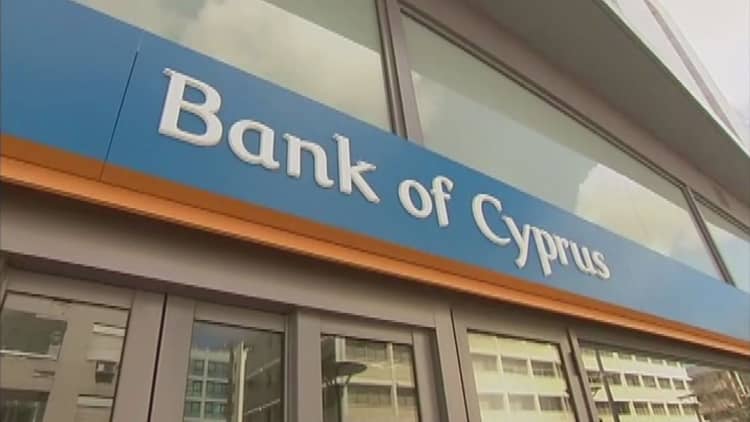
It doesn't seem too long ago that Europe looked on in despair as yet another country appeared on the brink of collapse. Back in 2013 panic spread through Cyprus financial system as government bonds were downgraded to junk status and long queues formed outside cash machines as the country failed to make ends meet.
Fast forward to March 2016 via a rescue package program, raft of reforms and austerity measures and the country is exiting its three-year, 10 billion euro financial aid package as one of the more robust euro zone economies. It has also been given a big pat on the back by creditors.
CNBC has a rundown of what happened to Cyprus and where it's going now.
What's going on?
Cyprus exited its 10 billion euro ($11 billion) bailout on Monday without any successor arrangement, in fact, about 30 percent of its entire bailout funds were not even utilized. Cyprus was commended in a statement from the Eurogroup of euro zone finance ministers, one of the bodies which oversaw the implementation of its bailout program, on Monday.
"The Eurogroup commends the Cypriot authorities for the overall successful implementation of the program and the important achievements made in the past three years, and also thanks the institutions for their vital contribution towards this end."
The Eurogroup welcomed the fact that economic activity has continued on a positive trend, and the banking system had "further healed.
"The commitment of the authorities and the Cypriot people to the overall program agreements has also been essential to a fiscal performance that has exceeded expectations. These positive developments have been instrumental in regaining investor confidence in the Cypriot economy, with the sovereign returning to the international markets," the group added.
What happened?
The exit is important for the island nation as it heralds the country's return to international credibility on the financial markets after it became the fourth euro zone country to seek a bailout (Ireland, Portugal and Greece had all been bailed out before with Spain also taking aid to help out its banks) in 2013.
The island's banking system collapsed in 2013, largely due to its exposure to Greece which experienced a sovereign debt crisis in 2012. In return for the 10 billion euros bailout, Cyprus also had to agree to a "bail-in" – using deposits and banking controls to contribute to the banks' rescue.
This saw the Cyprus Popular Bank wound down and another – the Bank of Cyprus – recapitalized by measures including the controversial seizure of depositors' uninsured savings above 100,000 euros ($120,000). Many of those affected by the deposit seizure were Russians believed to be using the island as a tax haven.
Cyprus was given the financial lifeline overseen by the so-called "troika" of financial institutions including the International Monetary Fund (IMF), European Central Bank (ECB) and European Commission.
Read More Cyprus could be 'out of the danger zone'
What has Cyprus done right?
A lot of Cyprus' success in completing its bailout program has been down to its strict adherence to austerity measures and the implementation of reforms, including those to the public sector and pension system and a privatization plan, that was required by the troika.
Aware that markets are now watching to see whether it can maintain its fiscal discipline, Cyrpus' finance minister told CNBC in February that even when Cyprus exits its bailout, it remained "very focused and very committed on maintaining the reform effort and maintaining fiscal disciplines and keeping a watchful eye on our banking sector," Harris Georgiades said.
Despite the success of the country's bailout, non-performing loans (NPLs) remain a thorn in the side of the Cypriot banking system with the latest data from the country's central bank showing the total number of bad loans is around 27 billion euros.
The future
Cyprus can now demonstrate an enviable growth with its economy expanding 0.4 percent in the fourth quarter, according to the latest data from Eurostat, more than Germany's 0.3 percent in the same period and Portugal and France's 0.2 percent.
However, euro zone watchers have learnt to that guarded optimism is the best course of action in a region with low inflation, essentially low growth as a whole and sticky unemployment in many countries which is often a truer test of business confidence and recovery – in Cyprus, for example, 15.3 percent of adults are still unemployed.
Likewise, the Eurogroup held no illusions that Cyprus could now take its eye off the ball. While Cyprus' banking system had gone through what it called a "deep transformation," it said work must continue with determination to secure the reduction of the non-performing loan ratio "to healthier levels."
The Eurogroup also said that Cyprus should complete the privatization of the Cypriot Telecommunications Authority, what it said would be "another growth-enhancing step."


